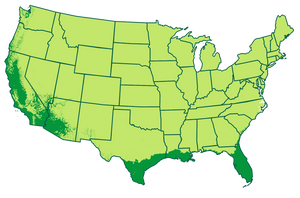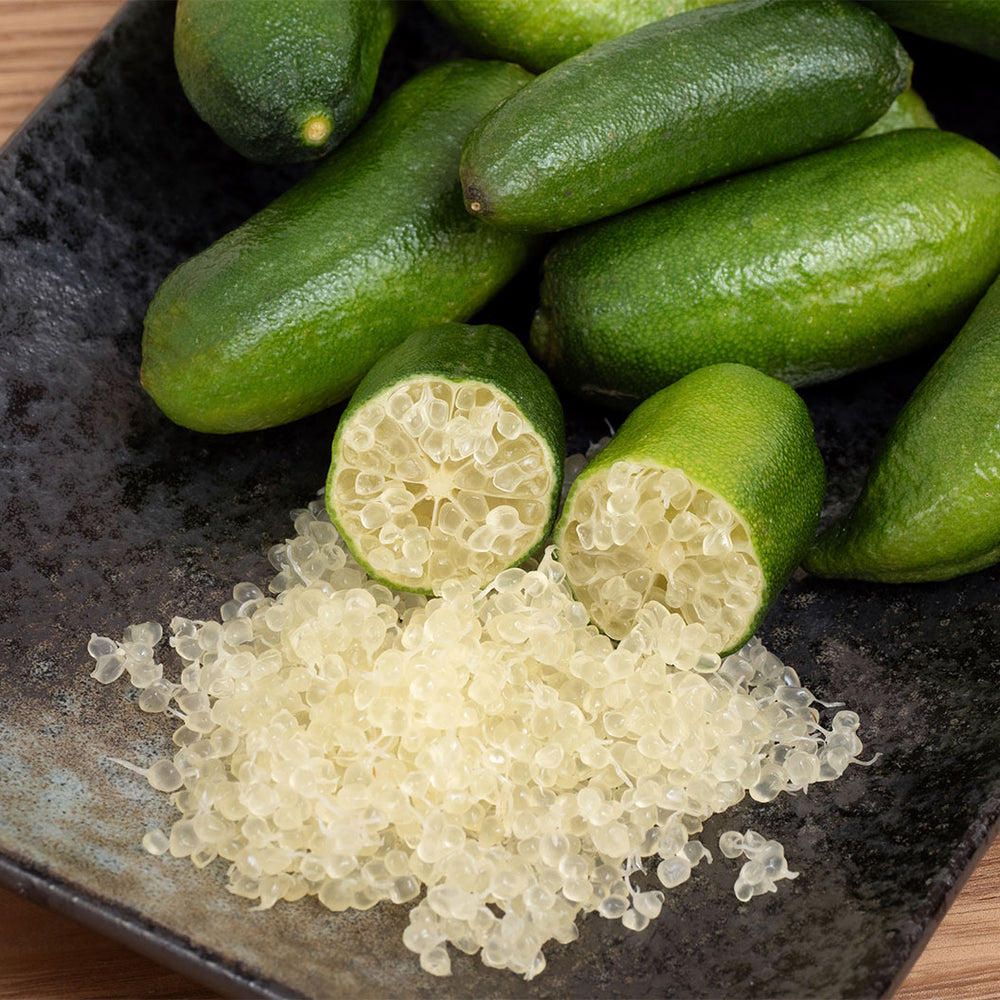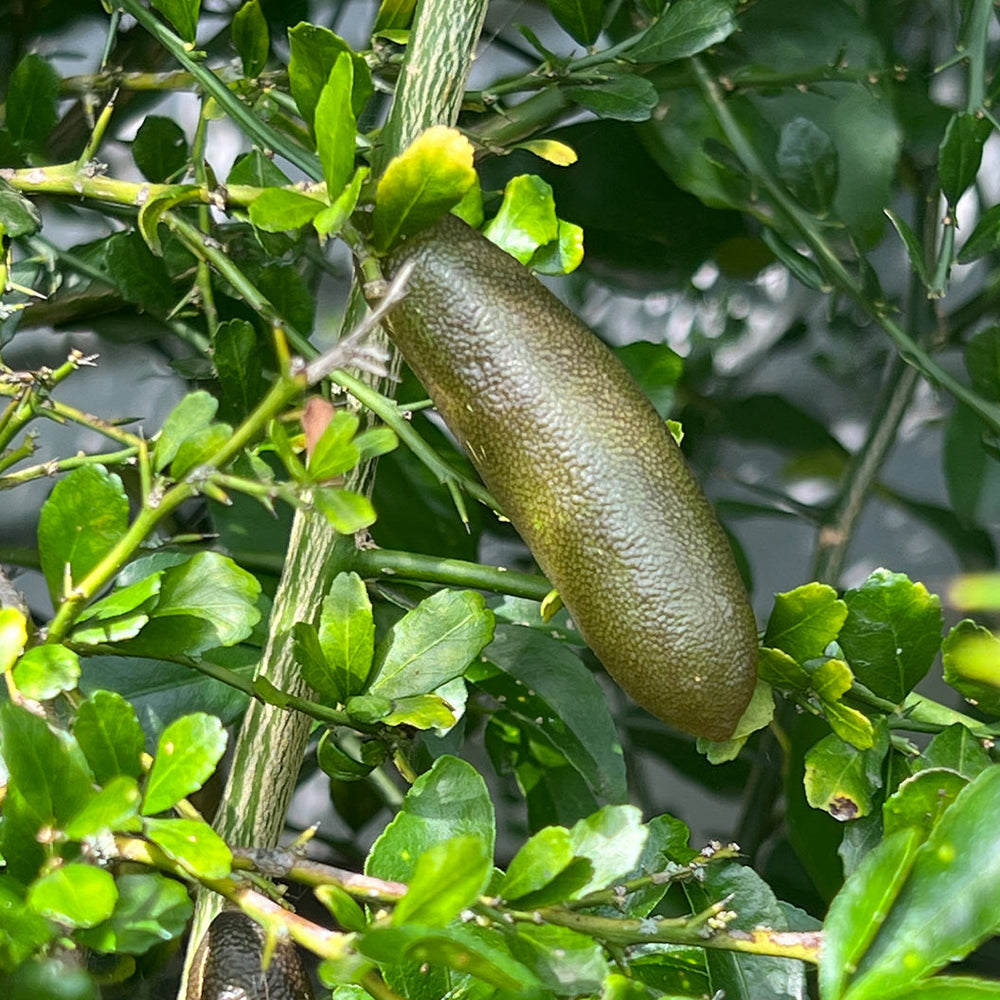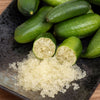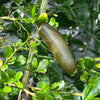* Images shown are of mature plants

Have questions? Talk with our Plant Experts (800) 973-8959
Save 25% on $200+ with code FALL25.
Questions? Call our plant experts: (800) 973-8959
Tangy, Juicy Fruit Called "Citrus Caviar" for Bursting Pearls
Have a taste of something different with the Giant Finger Lime Tree. This variety, larger than the Australian Finger Limes, offers even more bursting pearls inside the bright green rind for a tantalizing flavor!
Also known as citrus caviar, this unique fruit is full of juicy bubbles inside that are described as a combination of lime, lemon, and grapefruit. You get a world of flavors in each bite with this spring-blooming fruit.
Plus, these finger-like fruits add delicious flavor and texture to any recipe, making them a delicacy for your homemade drinks, treats, and more. This fruit also provides a sensational fragrance, turning your garden or home into a sweetly scented orchard full of deep green fruits.
Plant just one of the self-pollinating Giant Finger Lime Trees to enjoy seasons of bounties. Buy yours today!
Pollination Info
Giant Finger Lime Tree Pollination
Giant Finger Lime Trees are self-fertile. You will get fruit with only one plant. However, adding an additional Giant Finger Lime Tree will drastically increase the size of your crop.
Planting & Care
1. Planting: Select a location for your tree that receives 6 to 8 hours of sunlight daily, as they thrive in full sun but can tolerate some shade. For potted trees, daily misting and placing a tray of rocks with water underneath can help maintain humidity.
If winter temperatures drop below 40 degrees Fahrenheit, use a container with casters for easy movement between indoors and outdoors. Choose a pot slightly larger than the one it came in, ensuring it has ample drainage holes.
Use well-draining potting soil suitable for acid-loving citrus plants. Fill the pot with soil, position the tree in the center, backfill with soil, and water to settle the roots.
2. Watering: Water your plants once or twice a week, allowing the top 2 to 3 inches of soil to dry out completely before the next watering. Mulching helps retain moisture and reduce weeds. Stop watering once you see water escaping from the pot's drainage holes.
3. Fertilizing: Feed your lime tree with a citrus-specific fertilizer every six weeks during spring and summer. In fall and winter, reduce to every 2 to 3 months. After a few years, you can skip winter fertilization. Always follow the instructions on the fertilizer bag.
4. Pruning: Remove dead or crossing limbs with 45-degree cuts to improve airflow and light. After fruiting, prune dead wood and suckers growing from the base.
5. Pollination: Self-pollinating plants do not require additional plants for fruiting, but other citrus trees can increase fruit production.
Related Resources
Expert Q&A: Tips and Tricks for Citrus Tree Care
You asked, we answered! Citrus trees are some of our most popular - and most frequently asked-about - plants. And whether you have a patio ...
Read the full article
Growing Zones Guide: Zones 9-11
If you’re located in Zones 9-11 and need some planting and care tips, check out our growing guide below so you can grow with confidence ...
Read the full article
Fall Fruit Trees: From Harvesting to Foliage Colors
Fall is favored for many reasons, one of the best being fall fruit harvesting. Autumn is the peak season for harvesting and enjoying many favorite, ...
Read the full article
Shipping Details
Estimated Shipping Time: Most orders ship immediately. As noted on the website, some items are seasonal, and may only ship in spring or fall. Once your order is shipped, you'll receive an email with a tracking number.
| Amount of Order | Shipping Charge |
|---|---|
| Less than $49 | $19.95 |
| $49 + | FREE SHIPPING! |
Product Details
| Mature Height: | 10 ft. |
| Mature Width: | 6 ft. |
| Sunlight: | Full-Partial |
| Growth Rate: | Slow Growing |
| Botanical Name: | Citrus Australasica x Citrus spp. |
| Does Not Ship To: | AK, AL, AZ, CA, FL, HI, LA, MS, OR, TX |
| Grows Well In Zones: | 3-11 patio / 9-11 outdoors |
| Your Growing Zone: | # |
